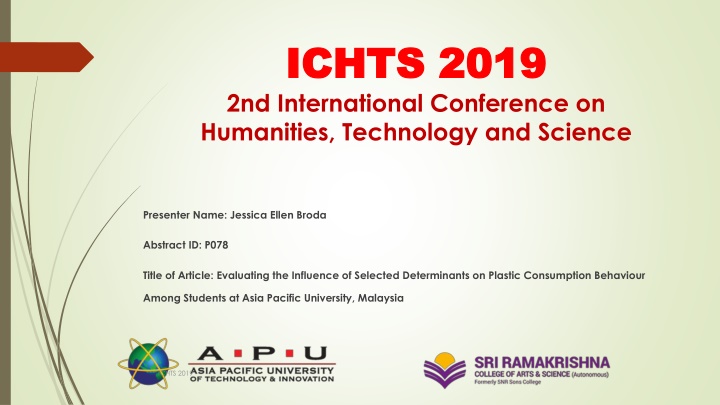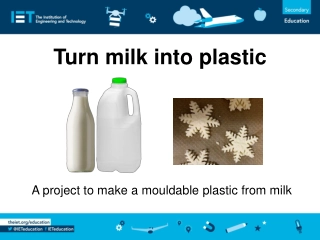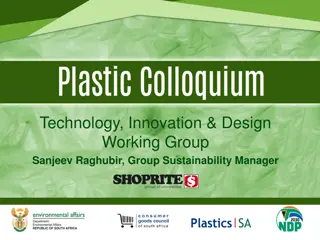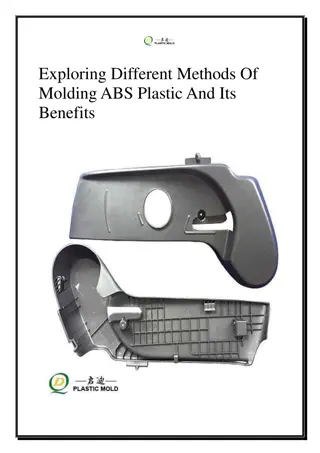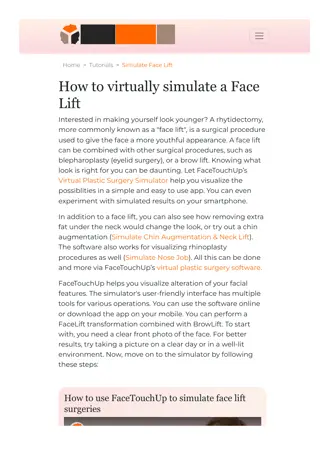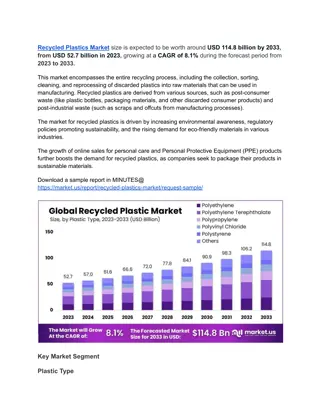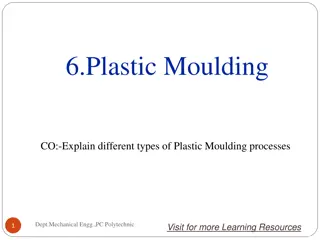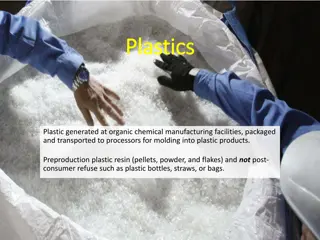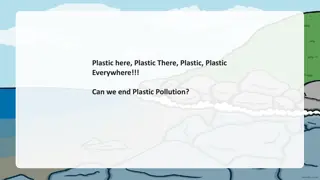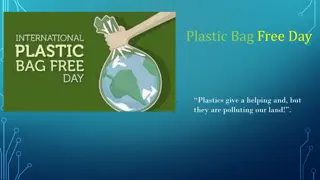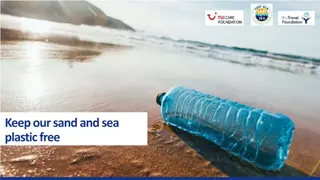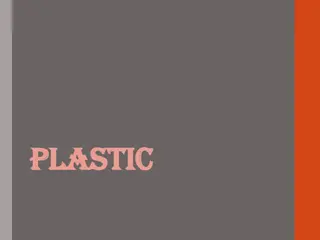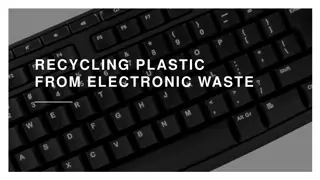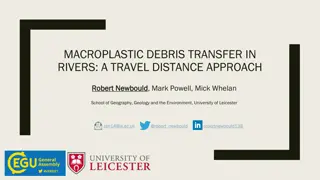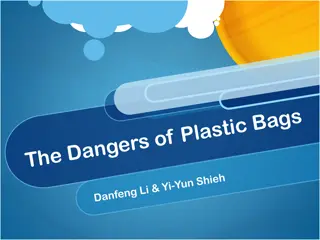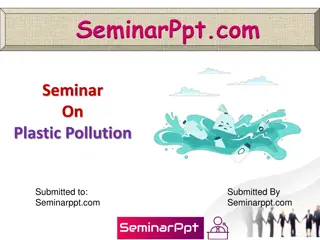Evaluating Factors Affecting Plastic Consumption Among Students
This research study aims to evaluate the influence of various determinants on plastic consumption behavior among higher education students in Kuala Lumpur, Malaysia. The study will assess the impact of geo-demographic, psychographic, and behavioral factors such as nationality, gender, age, educational level, environmental concern, and habits on the frequency of engagement in behaviors that reduce plastic consumption. By identifying these factors, the research seeks to contribute to effective strategies for reducing plastic waste generation and promoting sustainable behaviors among students.
Download Presentation

Please find below an Image/Link to download the presentation.
The content on the website is provided AS IS for your information and personal use only. It may not be sold, licensed, or shared on other websites without obtaining consent from the author.If you encounter any issues during the download, it is possible that the publisher has removed the file from their server.
You are allowed to download the files provided on this website for personal or commercial use, subject to the condition that they are used lawfully. All files are the property of their respective owners.
The content on the website is provided AS IS for your information and personal use only. It may not be sold, licensed, or shared on other websites without obtaining consent from the author.
E N D
Presentation Transcript
ICHTS 2019 ICHTS 2019 2nd International Conference on Humanities, Technology and Science Presenter Name: Jessica Ellen Broda Abstract ID: P078 Title of Article: Evaluating the Influence of Selected Determinants on Plastic Consumption Behaviour Among Students at Asia Pacific University, Malaysia ICHTS 2019
Problem Statement Production capacity in 2018: 348 million tons. High income countries generate more plastic waste per person than low- and income countries (Kaza et al, 2018). The growing production and use of plastics have so far not been matched by the development of suitable systems to properly dispose the generated plastic waste (GESAMP, 2015). Most plastic waste that has been collected through systematic methods are recycled, used for energy recovery or send to landfills (PlasticsEurope, 2019). A large number of high-income countries send their plastic waste overseas to Southeast Asian countries such as Malaysia for destruction. In Southeast Asia most of the waste is illegally recycled which endangers the health of the local community (Mosbergen, 2019). Recycling is only a short-term solution. Effective solutions include technical approaches, and the change of public behavior. Not a lot of studies exist which evaluate the factors influencing plastic consumption behavior and how to effectively change it (Heidbreder et al, 2019). ICHTS 2019
Research Objectives General: Evaluate which variables influence the frequency of engagement in behaviours that lead to a reduction of plastic consumption among higher education students in Kuala Lumpur, Malaysia. To determine whether there is a relationship between geo-demographic determinants nationality, gender, age, and educational level and the frequency of engagement in behaviors that lead to a reduction of plastic consumption. To determine whether there is a relationship between psychographic determinants environmental concern and plastic pollution awareness and the frequency of engagement in behaviors that lead to a reduction of plastic consumption. To determine whether there is a relationship between behavioural determinant habits and the frequency of engagement in behaviors that lead to a reduction of plastic consumption. ICHTS 2019
Research Framework Dependent Variable Independent Variables Nationality Gender Age Education level Geo- Demographic Plastic consumption behaviour Environmental concern Plastic pollution awareness Psychographic Habits Behavioural ICHTS 2019
Past Research Determinant Nationality Statement Previous Studies Morren et al. (2016) Bonera et al. (2017) Romero et al. (2018) Literature does not draw a clear picture. Influences are present, but lack clarity. Age Relationships are existent. Although the correlation is not always unambiguous. Kurisu et al. (2011) Elgaai ed-Gambier (2016) Afroz et al. (2016) Gender The literature suggests that women engage in favourable behaviours more frequently. Chen et al. (2011) Jez ewska-Zychowicz et al. (2015) Hohmann et al. (2016) Lynn et al. (2017) Educational Level The literature indicates that a high level of education translates into favourable behaviour. Jez ewska-Zychowicz et al. (2015) Afroz et al. (2016) Lynn et al. (2017) ICHTS 2019
Past Research Determinant Environmental Concern Statement Previous Studies Hornsey et al. (2016) Elgaai ed-Gambier (2016) Hall et al. (2018) Mei et al. (2016) Keep Britain Tidy (2018) Heidbreder et al. (2019) The findings of literature are not consistent. No conclusions can be drawn. Awareness is not a strong predictor for consumption behaviour. Level of awareness is expected to be higher than actual behaviour. Plastic Pollution Awareness Habits Habits have a huge influence on plastic consumption behaviour. Can either prevent or support the establishment of new behaviours. Zen et al. (2013) Romero et al. (2018) Heidbreder et al. (2019) ICHTS 2019
Theories Hofstede s Cultural Dimensions (1980) Six dimensions, which represent independent attitudes that distinguish the cultures of different countries from each other. Power distance, individualism, masculinity, uncertainty avoidance, long-term orientation, and indulgence (Hofstede, Hofstede & Minkov, 2010). Triandi s Theory of Interpersonal Behaviour (TIB) (1977) Based on the idea that behaviour is either determined through a rational path that involves reflection, or from a habitual path, depending largely on the number of times the behaviour has been undertaken to date. Habits and intention mediated by facilitating conditions lead to behavior (United Kingdom. Department for Environment, Food and Rural Affairs, 2011). ICHTS 2019
Methodology Mixed methods research (quantitative + qualitative methods) During literature review it has been found out that habits seem to be playing a significant role in plastic consumption behaviour and therefore it was decided to look deeper by carrying out qualitative methods. Use of primary data: survey and interview methods were used Cross-sectional research Deductive approach (theories were tested and developed) Population: APU-students Sample size: Minimum of 370 participants (actual sample size: 417) ICHTS 2019
Recommendations Theoretical: Some of Hofstede s Cultural Dimensions are relevant for explaining national and cultural differences in plastic consumption behaviour. Therefore the development of a new Cultural Dimension is proposed: natural environment vs. economy . The results of this study show a slight correlation of environmental concern and a more frequent engagement in behaviours that lead to the reduction of plastic consumption. The Value-Attitude-Behaviour Hierarchy can therefore neither be denied or supported. The TIB offers a useful and effective framework to identify the habits, intentions, and facilitating conditions which motivate the behaviour to reduce plastic consumption. Practical: The findings of the study indicate that several determinants influence the frequency of engagement in behaviors that lead to a reduction of plastic consumption. Practical approaches must go beyond raising awareness, but instead include. ICHTS 2019
Conclusion Plastic pollution is a rapidly growing threat that does not comply with geographic or political boundaries. Concerns all humans and living creatures. While humans are the cause of the problem, they are also the only solution to it. Reduction of plastic consumption and therefore behaviour change is needed urgently. Interventions to change behaviour need to be conducted with focus on: Raising awareness Establishing new habits Adapting to the needs of both genders. Strengthening the social support in all cultures. Defining behaviours that lead to a reduction of plastic consumption as the standard everyone is supposed to follow. ICHTS 2019
